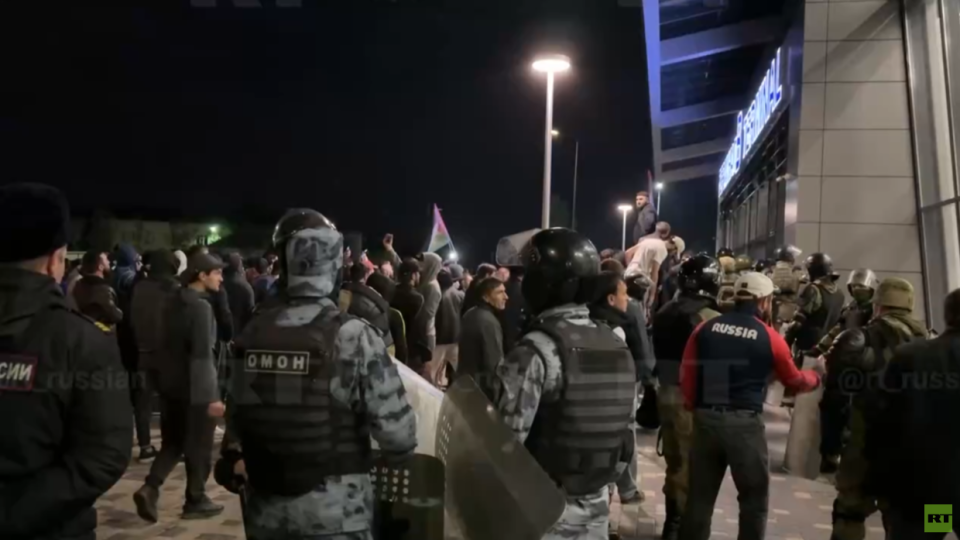An angry crowd has invaded the airport in Makhachkala amid rumors of inbound “refugees” allegedly heading there from Israel
There have been a string of anti-Jewish incidents in Russia’s southern Muslim-majority regions, since the war between Israel and the Palestinian militant group Hamas began, earlier this month.
Media sources in Moscow believe the unrest has been encouraged by Ukraine-based Telegram channels running information war operations.
The latest major flashpoint took place on Sunday, when hundreds of anti-Jewish protesters breached the international airport of Makhachkala, the capital of the Republic of Dagestan.
What happened?
Hundreds of angry protesters, some of whom were carrying Palestinian flags and anti-Jewish placards, massed outside the Makhachkala airport late on Sunday. The unauthorized gathering was prompted by online rumors of a flight, allegedly inbound from Tel Aviv and carrying “Jewish refugees” purportedly fleeing the conflict in the Middle East.
The mob scuffled with airport police, breaking doors of the terminal and forcing its way into the facility. Rioters streamed into the terminal, got onto the runway and blocked newly-landed flights as they searched for Israeli passengers.
Response from the authorities
The unrest at the airport prompted a massive police response, with dozens of law enforcement vehicles spotted at the scene. Police clad in riot gear entered the airport, detaining multiple protesters, footage circulating online suggests. Some 20 people, including at least six police officers, were injured in clashes, according to local health authorities.
The local directorate of the Russian Interior Ministry said a criminal probe into the organization of mass rioting has been launched. The offense incurs heavy penalties and can land offenders behind bars for up to 15 years. Apart from that, individuals making hateful racially- and religiously-charged public remarks may face criminal probes as well, the directorate has warned.
Other anti-Jewish incidents
A day earlier, an angry crowd searched a hotel in the Dagestani city of Khasavyurt for the “Jewish refugees,” rumored to be living there. The crowd found none, and the incident was resolved peacefully.
Separately, a Jewish cultural center under construction in the city of Nalchik, the capital of Russia’s Kabardino-Balkaria Republic, was targeted by unknown assailants. The attackers set the building ablaze and tagged it with anti-Semitic graffiti.
Ukrainian intelligence behind the unrest?
The online rumors that prompted the unrest in Dagestan appeared to have originated from the Utro Dagestan (‘Dagestan Morning’) Telegram channel. Despite portraying itself as a local outlet, the channel had been exposed by both Russian officials and the Killnet hacker community as a project of Ukrainian intelligence services, set up to stir unrest in Russia.
The channel began to rapidly grow only shortly after the beginning of the conflict between Kiev and Moscow in February 2022, receiving lavish funding and becoming a major resource in the network of anti-Russian online outlets.
Fugitive former State Duma deputy Ilya Ponomarev, who had settled in Kiev in 2016 and was granted Ukrainian citizenship several years later, openly and repeatedly admitted, most recently just a few months ago, that the Dagestan Morning was one of “their” resources.
Branded a “foreign agent” by Moscow, Ponomarev previously claimed to be the mouthpiece of the so-called Russian guerilla group NRA, even though there is no conclusive evidence that it actually exists. Through Ponomarev, the group claimed responsibility for the murders of Russian journalist Darya Dugina and military blogger Vladlen Tatarsky, taking the heat off Kiev, after Moscow blamed Ukrainian special services for orchestrating both terrorist attacks.
Ukrainian President Vladimir Zelensky immediately reacted to the unrest at the airport with a lengthy post on X on Sunday evening, in which he accused Russia of “deeply rooted” antisemitism and “hatred toward other nations.” Meanwhile, Ponomarev’s team distanced itself from the source of the rumors, claiming that the ex-MP had not been in contact with the Dagestan Morning for over a year. RT




